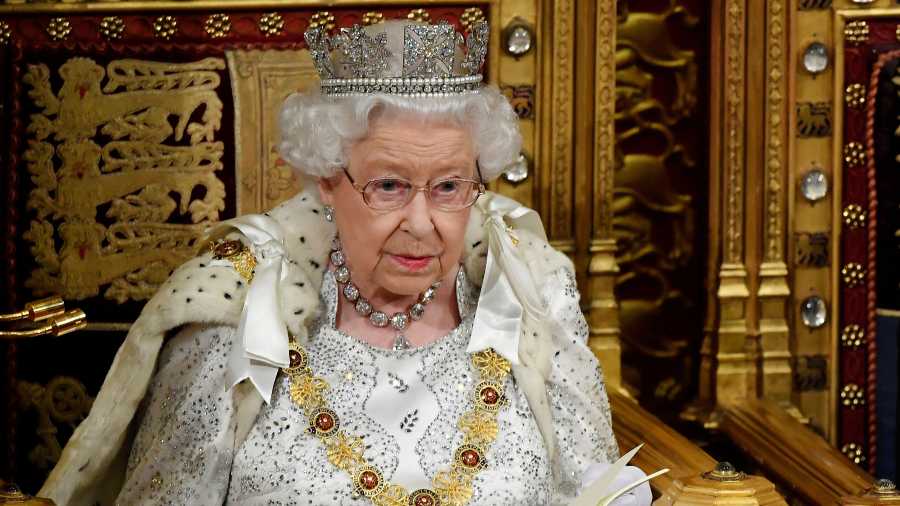The Queen’s Christmas message to the Commonwealth this year will be a “deeply personal one”, reflecting, as with millions of people around the world, a year of love and loss.
The 95-year-old monarch is expected to touch on the passing of Prince Philip in April at the age of 99 after 73 years of marriage.
In the broadcast she speaks beside a framed photograph of the couple taken during their diamond wedding anniversary in 2007 — and she is wearing the same sapphire brooch that appears in the photograph.
It's the same brooch, with a chrysanthemum design that she wore on her honeymoon in 1947. A service of thanksgiving for the life of Philip has been announced by Buckingham Palace, to be held in Westminster Abbey in the spring, with representatives of his charities and causes to be among the guests.
The Queen’s annual broadcast was recorded last week, before her decision to stay in Windsor Castle and cancel the traditional gathering of some 50 of her relatives she was planning at her estate in Sandringham in Norfolk. She won’t be entirely alone at Windsor — she will be joined by Prince Charles and his wife, Camilla, and a few other relatives.
Although the Queen is only a constitutional monarch, she appears to have a special position in British life. She will try and bring comfort to her people after a year of many bereavements.
On the radio, along with favourite carols such as Once In Royal David’s City and Silent Night, the constant refrain warns people: “Omicron is spreading.”
This year people seem to be making a special effort into putting Christmas lights in their front rooms.
People in England will be able to get a jab on Christmas Day and Boxing Day as part of efforts to target omicron variant, the NHS has said. Vaccinations were also taking place on Christmas Eve.
It now appears that following a booster following doses one and two, a fourth jab is looking a distinct possibility because of waning immunity from vaccinations, especially against Omicron.
Prof Clare Bryant, a professor of immunology at the University of Cambridge, told the BBC Radio 4’s Today programme that additional booster shots in the form of a fourth dose would be needed at some point, but exactly when was not yet clear.
“We are looking at fourth shots,” she said. “I suspect it’s a question of when those will need to be introduced because of course a waning in immunity means that you may catch the virus a little bit more easily - but don’t forget you’re still very well protected against severe disease and that’s absolutely critical.”
According to analysis from the UK Health Security Agency (UKHSA), those who received two AstraZeneca doses, plus a Pfizer or Moderna booster, have 60 per cent protection against Omicron for two to weeks after the third jab. But after ten weeks, it drops to 35 per cent for Pfizer and 45 per cent for Moderna.
The figures are further prompting officials to consider speeding up the rollout of the fourth jab to ward off a future surge in cases among those who have already received boosters.
Official findings that Omicron may be less likely to result in serious illness than Delta offer a “glimmer of Christmas hope”, the head of the UKHSA, Jenny Harries, told the BBC.
She said it was too early to retract her statement that the variant was the most serious threat the UK had faced during the pandemic. The UKHSA’s findings are “preliminary’, she said, and data around Omicron’s impact on the elderly is still needed.
Meanwhile, UK cases continue to surge. A record 119,789 new Covid infections were reported on Thursday. Responding to UKHSA analysis that those cases with Omicron – now the UK’s dominant strain – are less likely to need hospital care, Harries told the Today programme on Friday: “There is a glimmer of Christmas hope... but it definitely isn’t yet at the point where we could downgrade that serious threat. What we have got now is a really fine balance between something that looks like a lower risk of hospitalisation – which is great news – but equally a highly transmissible variant and one that we know evades some of our immune defences, so it is a very balanced position.”
The UKHSA estimates that someone with Omicron is between per cent 31 per cent and 45 per cent less likely to attend accident and emergency and 50 per cent to 70 per cent less likely to be admitted to hospital than an individual with the Delta variant.
However, Dr Harries warned there was much that is still unknown about Omicron. “We don’t yet know what the average length of stay for an individual is in a hospital. We’re not seeing very significant rises in intensive care utilisation or in the use of ventilation beds. Now that may be because a lot of the people who’ve been infected to date are actually younger people and we will see that coming through.”
But if the severity of the disease is actually “significantly lower than Delta” then some of the impact on the NHS may be less severe, she added.
At present, Prime Minister Boris Johnson has stuck to his Plan B measures – face masks, Covid passes and working from home guidance – and says no new measures will be announced before Christmas.










